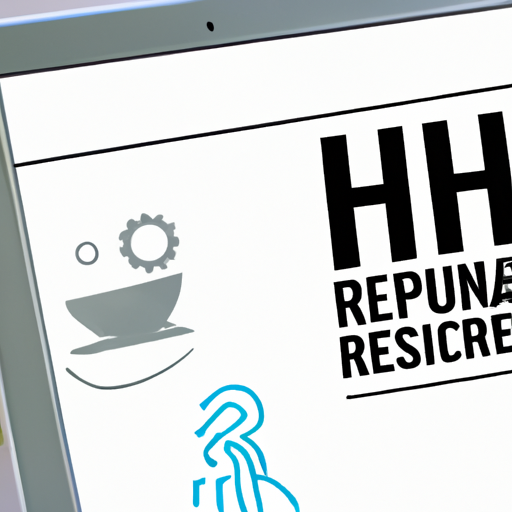In need of valuable resources to ensure HR compliance within your organization? Look no further. This article provides comprehensive insights and practical knowledge to help you navigate the intricate web of employment laws and regulations. From understanding the intricacies of wage and hour laws to implementing effective policies and practices, these resources will equip you with the tools necessary to maintain compliance and mitigate legal risks. By the end of this article, you will have a clear understanding of the importance of HR compliance and be ready to take the necessary steps to protect your business. So, let’s delve into the realm of HR compliance resources.

Understanding HR Compliance
HR compliance refers to the adherence of human resources (HR) practices and policies to the laws and regulations set forth by governing bodies. It ensures that businesses comply with legal requirements and maintain fair and ethical practices in their treatment of employees. By following HR compliance guidelines, organizations safeguard themselves against potential legal issues and create a positive and productive work environment.
What is HR Compliance?
HR compliance encompasses various aspects that businesses must address to ensure legal and ethical practices. This includes compliance with employment laws, anti-discrimination laws, wage and hour regulations, workplace safety regulations, and more. It also involves developing and implementing HR policies that align with legal requirements and effectively communicating and enforcing these policies.
Importance of HR Compliance
Compliance with HR regulations is crucial for businesses to operate within the legal framework and prevent legal consequences. Failing to comply with HR laws and regulations can result in costly fines, penalties, lawsuits, and damage to a company’s reputation. By prioritizing HR compliance, businesses can mitigate potential risks, maintain a positive work environment, and build a strong employer brand that attracts top talent.
Key Principles of HR Compliance
-
Knowledge of Laws and Regulations: It is essential for HR professionals to have a comprehensive understanding of federal, state, and local employment laws and regulations that govern the workplace. This knowledge enables them to develop and implement policies that align with legal requirements.
-
Proactive Approach: HR compliance requires a proactive approach, staying updated on changing laws, regulations, and best practices. By regularly reviewing and updating policies and practices, businesses can ensure ongoing compliance and prevent potential legal issues.
-
Equal Treatment: HR compliance emphasizes the fair and equal treatment of employees. This includes promoting diversity and inclusion, preventing discrimination and harassment, and providing equal opportunities for all individuals.
-
Documentation and Recordkeeping: Maintaining accurate and organized employee documentation is a key component of HR compliance. This includes employee contracts, policies, training records, performance evaluations, and any other relevant documents. Proper recordkeeping helps in demonstrating compliance and also facilitates effective HR management.
-
Effective Communication: Clear communication of HR policies and practices is essential for ensuring compliance. Employees should be aware of their rights, responsibilities, and expectations. Regular training sessions and open communication channels help in instilling a culture of compliance within the organization.
-
Enforcement and Accountability: HR compliance requires consistent enforcement of policies and addressing any violations promptly. Implementing disciplinary measures and holding individuals accountable for their actions sends a clear message that non-compliance is not tolerated.
Laws and Regulations
Overview of Employment Laws
Employment laws govern various aspects of the employer-employee relationship. These laws cover areas such as minimum wage, overtime pay, workplace safety, anti-discrimination, employee benefits, and more. It is crucial for businesses to have a thorough understanding of applicable federal, state, and local employment laws to ensure compliance.
Anti-discrimination Laws
Anti-discrimination laws prohibit employers from discriminating against individuals based on protected characteristics, such as race, gender, age, religion, national origin, disability, and more. These laws ensure equal employment opportunities and fairness in the workplace. Employers must have policies and procedures in place to prevent discrimination and address any complaints or issues that may arise.
Wage and Hour Regulations
Wage and hour regulations determine the minimum wage, overtime pay, and working hours for employees. These regulations aim to protect workers from unfair practices and ensure adequate compensation for their work. Employers must adhere to these regulations and maintain accurate records of employee working hours and wages.
Workplace Safety Regulations
Workplace safety regulations are in place to protect employees from hazards and ensure a safe working environment. Employers must comply with safety standards, implement safety protocols, provide adequate training, and maintain proper recordkeeping. Failure to comply with workplace safety regulations can result in serious injuries, fines, and legal consequences.
Developing HR Policies
Importance of HR Policies
HR policies play a crucial role in managing employee behavior, work standards, and promoting a fair and consistent work environment. Well-defined HR policies ensure that employees are aware of the organization’s expectations, rights, and responsibilities. These policies also serve as a reference point for addressing employee-related issues and maintaining compliance with laws and regulations.
Creating Effective HR Policies
When creating HR policies, businesses should consider their specific industry, size, and unique needs. Policies should be written in a clear and concise manner, easily understandable to employees. They should cover areas such as code of conduct, anti-discrimination, harassment prevention, leave policies, performance management, and more. Policies should be regularly reviewed and updated to ensure alignment with changing laws and best practices.
Common HR Policies
While specific HR policies may vary from company to company, some common policies include:
- Code of Conduct and Ethics
- Anti-discrimination and Harassment Prevention
- Attendance and Time-Off Policies
- Leave and Vacation Policies
- Performance Management and Appraisal Guidelines
- Confidentiality and Data Protection
- Internet and Social Media Use
- Workplace Safety Policies
Communicating and Enforcing Policies
To ensure the effectiveness of HR policies, it is crucial to communicate them clearly to all employees. This can be done through employee handbooks, training sessions, and regular communication channels. Managers and supervisors play a vital role in enforcing these policies consistently and addressing any violations promptly. Regular training and refresher sessions can help reinforce policy compliance and ensure a positive work environment.

Employee Documentation
Types of Employee Documentation
Employee documentation refers to various records and paperwork related to employees’ employment and performance. These documents serve as evidence of compliance, protection against legal claims, and can help in making informed decisions. Common types of employee documentation include:
- Employee Contracts and Agreements: Employment contracts outlining the terms and conditions of employment, including compensation, benefits, working hours, etc.
- Employee Handbook: A comprehensive document that communicates HR policies, procedures, benefits, and expectations to employees.
- Recordkeeping Requirements: These include maintaining records of employee attendance, leave, performance evaluations, training, and more.
Employee Contracts and Agreements
Employee contracts and agreements are legally binding documents that establish the terms and conditions of employment. These contracts outline the rights and obligations of both the employer and employee, including compensation, benefits, working hours, responsibilities, confidentiality agreements, and more. Complying with contract requirements is crucial to avoid legal disputes and ensure a clear understanding between parties.
Employee Handbook
An employee handbook is a vital tool for communicating HR policies and procedures to employees. It provides a centralized source of information, ensuring consistency in policy application and promoting transparency. An effective employee handbook should include policies related to anti-discrimination, harassment prevention, code of conduct, leave and attendance, technology usage, performance management, and other relevant areas. It is important to update the handbook regularly to reflect any changes in policies or legal requirements.
Recordkeeping Requirements
Maintaining accurate and organized employee records is crucial for HR compliance. These records include employee information, attendance records, performance evaluations, training records, disciplinary actions, and other relevant documents. Proper recordkeeping helps in demonstrating compliance with various employment laws, resolving disputes, and tracking employee progress and development. Employers must ensure they meet the recordkeeping requirements outlined by applicable laws and regulations.
Recruitment and Hiring Process
Fair Hiring Practices
Fair hiring practices involve treating all job applicants fairly and impartially, ensuring equal employment opportunities. This includes using non-discriminatory criteria in job advertisements, selection process, and in making hiring decisions. Employers must avoid any form of discrimination and provide reasonable accommodations for individuals with disabilities during the recruitment process.
Job Descriptions and Requirements
Clear and accurate job descriptions are essential for attracting suitable candidates and establishing performance expectations. Job descriptions should outline key responsibilities, qualifications, skills, and experience required for the position. It is important to ensure that job requirements are job-related and comply with anti-discrimination laws.
Background Checks and Drug Testing
Background checks and drug testing are often conducted as part of the pre-employment process to ensure a safe and productive work environment. When conducting background checks, employers must comply with applicable laws, including requiring proper consent and notifying candidates about their rights. Drug testing should be conducted in compliance with relevant laws, and employers should have written policies in place regarding drug and alcohol use.
Interview Process
The interview process is a crucial stage in the hiring process. Employers should follow a consistent and fair interview process that aligns with anti-discrimination laws. Interview questions should focus on job-related qualifications and skills and avoid any personal inquiries that may be discriminatory. Interviewers must be trained on fair and legal interviewing techniques to ensure compliance and select the most qualified candidate for the position.

Onboarding and Orientation
Introduction to Onboarding
Onboarding is the process of integrating and orienting new employees into the organization. It is a critical stage in the employee lifecycle and plays a significant role in ensuring a positive and productive work environment. Effective onboarding helps new employees feel welcome, informed about the organization’s culture, policies, and their role within the company.
Creating an Onboarding Program
Developing a structured onboarding program provides a standardized approach to welcoming new employees. The program should include activities such as introductions to key personnel, providing necessary equipment and resources, providing an overview of HR policies and procedures, and setting clear expectations. A comprehensive onboarding program ensures that new employees quickly acclimate to their roles and become productive members of the organization.
Orientation Process
Orientation is a component of the onboarding process that focuses on introducing new employees to the organization’s culture, values, policies, and procedures. It includes familiarizing employees with their physical work environment, organizational structure, employee benefits, safety protocols, and any other relevant information. A well-designed orientation process helps new employees feel comfortable and confident in their new roles.
Training and Development
Training and development are essential for employee growth and enhancing job performance. Employers should provide ongoing training opportunities to employees to develop their skills, keep them updated with industry trends, and meet job requirements. Training programs should be designed to align with business needs and compliance requirements, ensuring that employees have the necessary knowledge and skills to perform their roles effectively.
Employee Benefits
Importance of Employee Benefits
Employee benefits are an important component of a competitive compensation package and play a significant role in attracting and retaining top talent. Benefits such as health insurance, retirement plans, paid leave, and other perks contribute to employee satisfaction and overall well-being. Offering comprehensive employee benefits can enhance employee morale, productivity, and loyalty.
Understanding Different Benefits
There are various types of employee benefits that organizations may offer. Some common benefits include:
- Health Insurance: Medical, dental, and vision coverage.
- Retirement Plans: 401(k), pension plans, and other retirement savings options.
- Paid Leave: Vacation, sick leave, and parental leave.
- Flexible Work Arrangements: Remote work options, flextime, and compressed workweeks.
- Employee Assistance Programs: Counseling, financial assistance, and other support services.
- Wellness Programs: Fitness memberships, wellness incentives, and health screenings.
- Bonus and Incentive Programs: Performance-based bonuses and rewards.
Managing Employee Benefits
Managing employee benefits involves ensuring compliance with legal requirements, accurately administering benefits programs, and effectively communicating benefits to employees. Employers must stay informed about changes in benefit laws and regulations, have systems in place to handle benefit enrollment, administer benefits in a timely manner, and regularly review the effectiveness of their benefits programs.
Legal Requirements
Offering employee benefits involves compliance with various legal requirements. Employers must ensure compliance with federal laws such as the Affordable Care Act (ACA), the Employee Retirement Income Security Act (ERISA), and the Family and Medical Leave Act (FMLA). Employers should also consider state and local laws that may require additional benefits or provide specific guidelines.
Performance Management
Defining Performance Management
Performance management involves the ongoing process of setting performance expectations, providing feedback, evaluating performance, and addressing any performance-related issues. It aims to improve employee productivity, align individual goals with organizational objectives, and foster employee development.
Setting Performance Goals
Clear and measurable performance goals are essential for effective performance management. Goals should be specific, attainable, relevant, and time-bound (SMART). Employers should communicate performance expectations to employees and provide regular feedback to help them achieve their goals.
Performance Evaluation Process
Performance evaluations are tools used to assess employee performance against set goals and expectations. Evaluations may include self-assessments, supervisor assessments, and input from colleagues or customers. Employers should conduct evaluations regularly, document feedback, and provide constructive criticism to help employees grow and improve their performance.
Addressing Poor Performance
Addressing poor performance is a crucial aspect of performance management. Employers should have a fair and transparent process for addressing performance issues, including communicating expectations, offering coaching and support, providing performance improvement plans, and taking appropriate disciplinary actions when necessary. Consistent and proactive management of poor performance can help prevent long-term issues and maintain a high-performing workforce.
Employee Relations and Conflict Resolution
Promoting Positive Employee Relations
Positive employee relations are vital for maintaining a harmonious and productive work environment. Employers should prioritize building relationships, fostering open communication, and promoting a culture of respect and fairness. Regular team-building activities, recognition programs, and open-door policies are effective tools in promoting positive employee relations.
Dealing with Employee Grievances
Employee grievances refer to complaints or concerns raised by employees regarding their work conditions, treatment, or any other workplace-related issues. Employers should have a procedure in place for handling grievances, including providing employees with a designated channel to voice their concerns, conducting thorough investigations, and taking appropriate actions to resolve the grievances in a fair and timely manner.
Conflict Resolution Strategies
Conflicts are inevitable in any workplace. Employers should be proactive in managing and resolving conflicts to maintain productivity and prevent escalations. Conflict resolution strategies may include mediation, negotiation, and facilitating open dialogues between conflicting parties. Training managers and supervisors on conflict resolution techniques can help them effectively address and resolve conflicts.
Mediation and Arbitration
In some cases, unresolved conflicts may require mediation or arbitration. Mediation involves a neutral third party facilitating discussions between the parties involved to reach a mutually satisfactory resolution. Arbitration, on the other hand, involves presenting the conflict to a third-party arbitrator who makes a binding decision. Both mediation and arbitration can help in resolving conflicts outside the courtroom, saving time and costs associated with litigation.
FAQs
What is the role of HR compliance in a business?
HR compliance plays a critical role in ensuring that businesses operate within the legal framework and maintain fair employment practices. It helps organizations prevent legal issues, minimize risks, and establish a positive work environment. By adhering to HR compliance guidelines, businesses can avoid costly fines, penalties, lawsuits, and damage to their reputation.
What are the potential consequences of non-compliance?
Non-compliance with HR laws and regulations can have serious consequences for businesses. It can lead to legal liabilities, such as fines, penalties, and legal disputes. Non-compliance can also damage a company’s reputation, resulting in the loss of customers and talented employees. Additionally, it can negatively impact employee morale, productivity, and overall organizational success.
How often should HR policies be reviewed and updated?
HR policies should be reviewed and updated regularly to ensure alignment with changing laws, industry standards, and organizational needs. As employment laws and best practices evolve, businesses must assess their policies, procedures, and practices to ensure compliance and effectiveness. Additionally, significant changes within the organization, such as mergers, acquisitions, or changes in business strategy, may also require policy updates.
What should be included in an employee handbook?
An employee handbook should include policies and procedures that are relevant to the organization and comply with employment laws. Key sections to include in an employee handbook are:
- Introduction and welcome message from company leadership
- Company mission, values, and culture
- Employment policies (e.g., anti-discrimination, harassment prevention, code of conduct, etc.)
- Compensation and benefits information
- Leave policies (vacation, sick leave, parental leave, etc.)
- Performance management and evaluation processes
- Technology usage and internet policies
- Safety and security protocols
- Confidentiality and data protection guidelines
- Grievance resolution procedures
- Employee acknowledgments and acknowledgments of receipt of the handbook
Can an employer terminate an employee without cause?
Employment laws vary, but in many jurisdictions, employers have the right to terminate an employee without cause as long as it is not in violation of any employment contracts, collective bargaining agreements, or anti-discrimination laws. However, it is generally recommended to consult with an employment lawyer to ensure compliance with applicable laws and minimize potential legal risks.

































